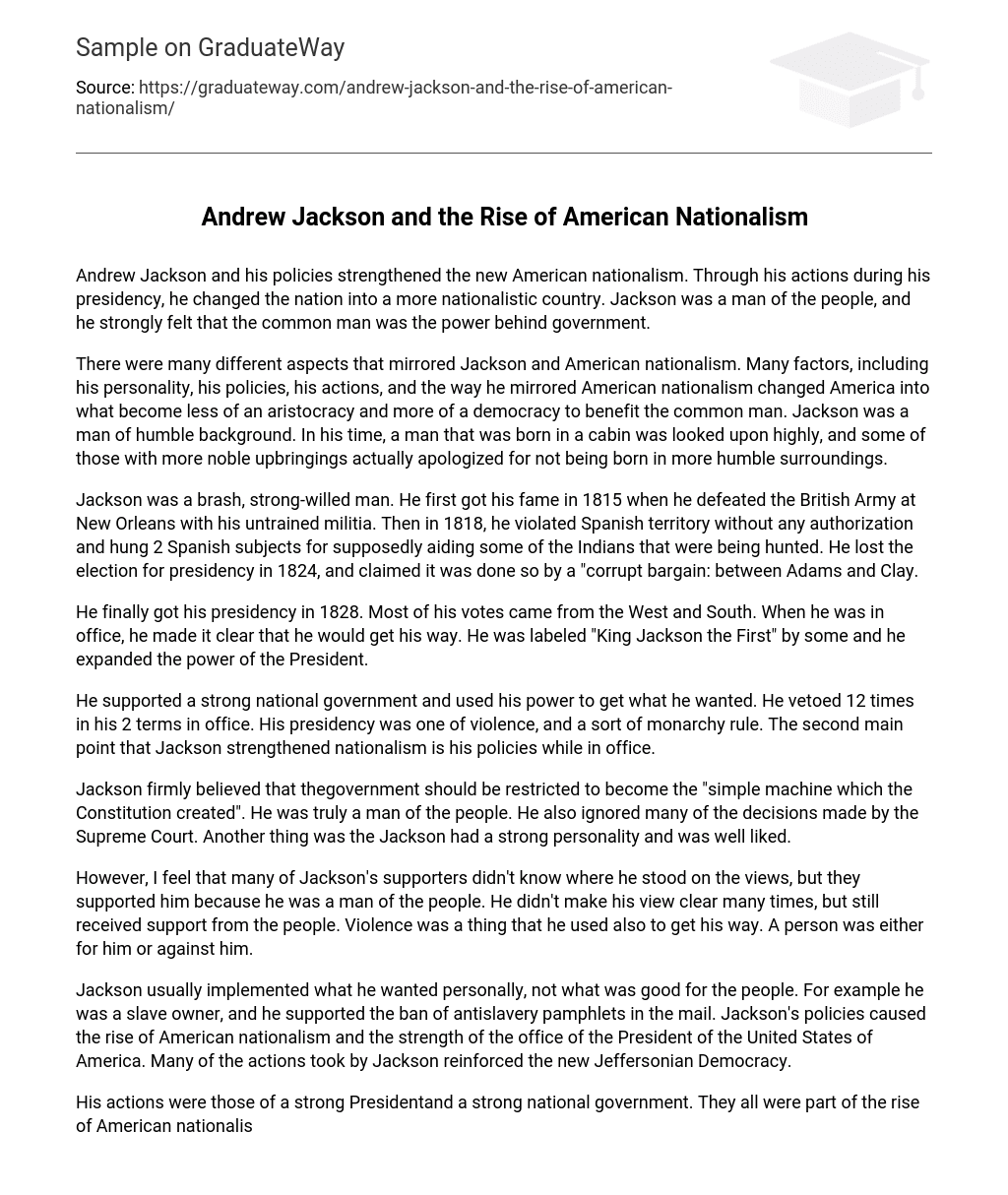Andrew Jackson’s presidency and policies played a role in strengthening American nationalism, gradually molding the nation into a more nationalistic entity. With his strong faith in the capability of everyday individuals, Jackson advocated for the notion that regular citizens possessed the essential elements for efficient governance.
Several factors, including Jackson’s personality, policies, actions, and alignment with American nationalism, played a role in America’s transition from an aristocracy to a democracy that focused on the common man. Despite his humble background, Jackson was highly respected during his time, to the extent that individuals from more privileged backgrounds expressed regret for not being born into humbler circumstances.
Jackson, a brave and resolute man, gained fame in 1815 for leading his inexperienced militia to triumph over the British Army at New Orleans. In 1818, he violated Spanish territory without permission and put to death two Spaniards who were accused of aiding Native Americans under pursuit. He suffered defeat in the 1824 presidential election and claimed that a “corrupt bargain” had occurred between Adams and Clay.
President Jackson was elected in 1828 with the majority of his votes coming from the West and South. Throughout his presidency, he demonstrated strong determination to accomplish his goals, earning him the nickname “King Jackson the First”. Furthermore, he enhanced the power of the President.
Jackson advocated for a robust central government and effectively wielded his authority to secure his objectives. He exercised the veto power on 12 occasions throughout his two terms as president. His tenure was marked by turmoil and a form of autocratic governance. Another key aspect of Jackson’s contribution to fostering nationalism lies in his policy decisions during his presidency.
Jackson had a strong belief that the government should adhere to the limitations set by the Constitution, making it a “simple machine.” He was highly regarded as a champion for the common people. Additionally, he consistently disregarded numerous rulings from the Supreme Court. Furthermore, Jackson possessed a charismatic personality and was widely popular.
Despite the ambiguity of Jackson’s views, he garnered support from many due to his reputation as a champion for the average person. Despite his lack of transparency, he enjoyed broad support and did not hesitate to employ force in pursuit of his goals. Individuals either rallied behind him or opposed him.
Jackson typically prioritized his own interests over the well-being of the populace. This can be seen in his ownership of slaves and his endorsement of a prohibition on antislavery literature being distributed through the mail. However, Jackson’s policies also led to the growth of American patriotism and increased the authority of the President of the United States. Many of Jackson’s actions further solidified the principles of Jeffersonian Democracy.
The actions of President were emblematic of a robust national government, contributing to the growth of American nationalism. He exercised his veto power to reject bills he deemed unfit, and issued a warning about deploying national forces in South Carolina to uphold the tariff. Nonetheless, his actions were not without inconsistency.
Although he appeared to advocate for a powerful central government, he also championed states’ rights by refraining from intervening when Georgia violated Native Americans’ rights as specified in a federal treaty. However, one of his significant actions was vetoing the Second Bank of the United States, which favored honest labor and posed a setback to monopoly and aristocracy. Jackson implemented measures to benefit the average person and bolstered American nationalism.
Jackson’s presidency reflected the rise of American nationalism and the decline of the aristocracy. As a common man, he championed the rights of the common people, consistently advocating for a government that operated within the boundaries set by the Constitution.
Showing nationalism is demonstrated by only granting the government the authority that the people have vested in it. Additionally, he endeavored to improve the economic situation of the common man within his jurisdiction. Jackson held reservations towards the National Bank since it disadvantaged the average citizen while bolstering the elite and corporations. These actions, collectively termed as Jacksonian Democracy, significantly advanced American nationalism during Jackson’s tenure as president.
Jackson, the first president who truly represented the common people, governed in accordance with his beliefs. He advocated for a robust yet restrained national government, employing its power to serve the common man, as he himself belonged to that category. During his presidency, Jackson undertook numerous measures that contributed to the enhancement of American nationalistic sentiment. By bolstering both presidential authority and the authority of the nation, he played a pivotal role in strengthening the sense of unity and patriotism.





